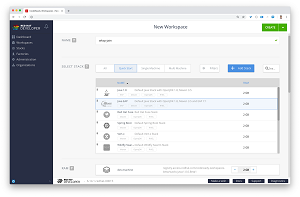News
Kubernetes IDE Offered by Red Hat
Kubernetes, getting more popular by the minute for its container orchestration expertise, now has its own integrated development environment (IDE) thanks to open source champion Red Hat.
Kubernetes is "an open source container orchestration system for automating application deployment, scaling, and management," says Red Hat. Enterprises find it particularly useful for eliminating many of the manual processes involved in deploying and scaling containerized applications.
The Red Hat CodeReady WorkSpaces IDE works with the company's OpenShift offering, which is described as "a container application platform that brings Docker and Kubernetes to the enterprise") and its flagship Red Hat Enterprise Linux (RHEL) distribution.
According to the company, Red Hat CodeReady Workspaces is based on the general-purpose Eclipse Che open source IDE and includes features such as:
- Centralized developer environments running in OpenShift Container Platform or OpenShift Dedicated.
- Multi-container workspaces for each developer that can be replicated with a single click using workspace Factories.
- Pre-built developer workspace stacks based on Red Hat Enterprise Linux 7 and Red Hat Enterprise Linux 8 Beta.
- The ability to create custom stacks for any language or runtime.
- Enterprise integration via Keycloak Single Sign-On (SSO) for Active Directory (AD) or Lightweight Directory Access Protocol (LDAP).
- The option to use the built-in browser-based IDE, or mount-and-sync between OpenShift and a desktop IDE via oc rsync (if enabled on the OpenShift cluster).
- Source code is hosted outside hard-to-secure endpoint devices like developer laptops.
- Other capabilities of Eclipse Che 6.x.
Those "other capabilities" of Eclipse Che 6.x can be seen in the project's most recent release notes.
 [Click on image for larger view.]
The CodeReady Workspaces IDE (source: Red Hat)
[Click on image for larger view.]
The CodeReady Workspaces IDE (source: Red Hat)
According to Red Hat exec Brad Micklea -- whose LinkedIn profile says he's the project lead for Eclipse Che -- the new IDE helps solve developer problems specific to working with Kubernetes.
"The challenge with building and deploying applications in any Kubernetes distribution is that it's difficult for a developer to set up a Kubernetes environment that enables fast, iterative development cycles," Micklea said in a Feb. 5 blog post. "As a result, some development teams fall back to using containers on their laptops and only seeing how things run in Kubernetes after they've merged code back to the origin code repository and triggered a continuous integration (CI) job.
"This is problematic as Kubernetes has unique execution behaviors that might necessitate code changes or optimizations. Waiting to do these until after code is merged back to master is inefficient and can introduce problems in the master branch that affect other developers."
CodeReady Workspaces addresses this issue by providing a fast "locally hosted-style" development experience from within Kubernetes, which he said helps developer teams avoid the "it works on my machine" problem, Micklea said.
Or, as the CodeReady Workspaces site says, "The entire product runs in an OpenShift cluster hosted on-premises or in the cloud and eliminates the need to install anything on a local machine."
Red Hat CodeReady Workspaces is available at no cost with an OpenShift subscription and is available for download upon joining the Red Hat Developer Program. The project's source code is available on GitHub.
About the Author
David Ramel is an editor and writer at Converge 360.